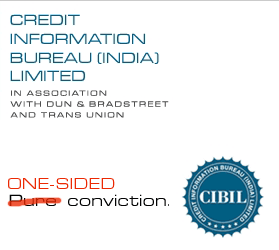
Credit Information Bureau of India Ltd. (CIBIL) is an organization that provides information on Indian individuals’ borrowing and bill paying habits.
CIBIL is the major credit bureau in India. This means if you apply for any financial credit (home loan, personal loan, credit card, car finance etc) within India, your lender will ask CIBIL about you before approving your loan or credit. Your lender and CIBIL identify you by your PAN number, among other things.
CIBIL does not tell your lender to give you a loan (or not to), it only provides the lending bank with a report of your loan and repayment history, as told to them by other banks. This report is called a Credit Report, and each report is identified by a 9-digit ‘Control Number’. Your lending bank uses this Credit Report to generate an internal Credit Score, based on their policies. For example, Axis Bank might have a stricter policy, and not provide loans to you based on your report, but ICICI might overlook a few discrepancies and charge you a higher interest rate to compensate for the increased risk.
So based on the information about you provided by CIBIL, you might receive or be denied credit.
But are all Credit Reports accurate?
One important point to note is that CIBIL does not actually investigate whether your payment history – it just collects information provided by banks, and allows other banks to access it. This means that CIBIL does not have any true responsibility for the content of the reports it provides.
But the information contained in the Credit Reports can be inaccurate due to many reasons. According to American studies done on their credit rating systems, 80% of all credit reports in the USA contain factual errors such as duplicate listings, incorrect dates, tradelines placed on the wrong person’s credit reports, and omitted positive credit accounts. These American studies also indicate that 25% of credit reports containing errors significant enough to result in a credit denial.
With the opaque and review-less system in India, the error percentage is bound to be higher.
Since lenders are not suitably penalised for reporting credit defaults incorrectly, they have no incentive to correct errors in the reports. CIBIL’s current policies therefore push the onus of correcting errors in the Credit Report on to the individual consumer – while denying them access to tools or information to do so.
Also, American consumers are entitled to one free copy of their Credit Report every year, which means they can try to correct errors. Indian consumers have no such option. CIBIL has been promising to allow Indian borrowers to access a copy of their own credit report, for a nominal Rs. 100 fee. But since 3 years, CIBIL has not delivered on it’s promise. Which means that the Indian consumer does not even have proper access to his own reports, let alone access to means of correcting errors in them.
How is an inaccurate report corrected?
Because you don’t have access to your own Credit Report, you cannot resolve any potential problems before they affect you. At the most, you can request your bank to pass on a Credit Report if they have one on you. But there is no reliable mechanism to know for sure if a report has been drawn on you.
If a Credit Report accuses a person of not having paid up, the person has the inalienable right to confront his accuser. Every time CIBIL delivers a credit report to a bank but denies access to the same report to the individual, CIBIL is depriving the consumer of these rights.
While Banks and Lenders face the risk of default if a Credit Report is incorrect, denying appropriate credit to individuals who deserve credit stifles the country’s financial growth. CIBIL needs to start being responsible and accountable for it’s actions.
How should we fix the lack of transparency in Credit Reports?
As we have seen, CIBIL’s current policies tilt the playing field against the individual consumer. What is the solution to this imbalance?
- CIBIL should immediately allow individuals access to their own Credit Report.
- For each day CIBIL denies an individual access to their own report, they should be held accountable and fined Re. 1 per day per report, per person.
- Banks and other entities who report transactions to CIBIL should be held accountable for the accuracy of that information. Any organization that provides incorrect information to CIBIL should face punitive fines, to the extent of having their license suspended for repeated errors.
- Till the time CIBIL does not provide Individuals access to Credit Reports, they should suspend Lenders’ access to the same Reports.
- Every individual should be entitled to one free copy of their own Credit Report, per annum. Additional requests can be charged a nominal Rs 100 fee.
The crux of the problem is that CIBIL has been dragging its feet over making reports accessible to individuals. This is not fair to the individual Consumer, making CIBIL a one-sided and unaccountable entity.
Denying credit when it is due has far-reaching effects on India’s growth and development, and transparency in the Credit Reporting system will ensure that lenders don’t deprive people of credit without due cause.
